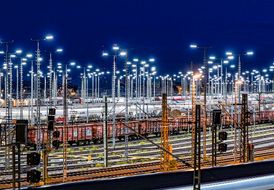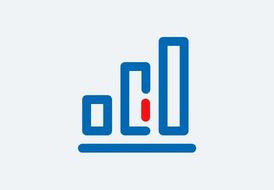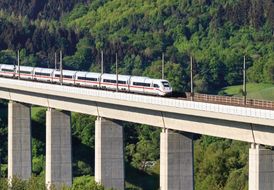Development in the year under review
- Increased revenues from price and volume effects.
- Personnel expenses increased as a result of collective bargaining agreements and personnel expansion.
- Higher expenses, in particular in connection with infrastructure damage and winter service.
- High project volumes.
| DB NETZE TRACK | 2021 | 2020 | Change | 2019 | ||
absolute | % | |||||
Punctuality DB Group (rail) in Germany (%) | 93.7 | 95.1 | –1.4 | – | 93.7 | |
Punctuality (rail) in Germany 1) (%) | 92.9 | 94.5 | –1.6 | – | 93.1 | |
Customer satisfaction (SI) | 61 | 66 | –5 | – | 65 | |
Length of line operated as of Dec 31 (km) | 33,288 | 33,286 | +2 | – | 33,291 | |
Train kilometers on track infrastructure (million train-path km) | 1,108 | 1,064 | +44 | +4.1 | 1,089 | |
thereof non-Group railways | 414.3 | 385.4 | +28.9 | +7.5 | 368.2 | |
Share of non-Group railways (%) | 37.4 | 36.2 | +1.2 | – | 33.8 | |
Total revenues (€ million) | 5,984 | 5,660 | +324 | +5.7 | 5,652 | |
External revenues (€ million) | 1,975 | 1,808 | +167 | +9.2 | 1,687 | |
Share of total revenues (%) | 33.0 | 31.9 | +1.1 | – | 29.8 | |
EBITDA adjusted (€ million) | 1,010 | 1,086 | –76 | –7.0 | 1,443 | |
EBIT adjusted (€ million) | 334 | 409 | –75 | –18.3 | 807 | |
Operating income after interest (€ million) | 225 | 266 | –41 | –15.4 | 628 | |
Gross capital expenditures (€ million) | 9,349 | 8,480 | +869 | +10.2 | 7,441 | |
Net capital expenditures (€ million) | 1,738 | 1,363 | +375 | +27.5 | 1,055 | |
Employees as of Dec 31 (FTE) | 51,290 | 50,330 | +960 | +1.9 | 48,787 | |
Annual average employees (FTE) | 51,270 | 50,008 | +1,262 | +2.5 | 48,114 | |
Employee satisfaction (SI) | – | 3.9 | – | – | – | |
Share of women as of Dec 31 (%) | 20.0 | 19.4 | +0.6 | – | 19.2 | |
Track kilometers noise remediated in total as of Dec 31 (km) | 2,110 | 2,039 | +71 | +3.5 | 1,844 | |
1) Non-Group and DB Group train operating companies.
The punctuality of both non-Group train operating companies in Germany and of intra-Group train operating companies declined in 2021. The main reasons for this were a renewed significant increase in train services and a high construction volume, leading to increased capacity utilization. This led to an overload, particularly at the existing bottlenecks, causing a detrimental impact on operating quality. In addition, individual events led to longer phases of limited facility availability. These mainly included the cold spell in February 2021, which affected multiple regions, and the floods in July 2021, as well as numerous storms caused by low-pressure systems.
Customer satisfaction fell significantly. About 270 customers were surveyed in 2021. In particular, the areas of construction work and infrastructure availability continued to be viewed very critically.
Train kilometers on track infrastructure increased significantly again. The drivers were, in particular, fewer Covid-19-related outages and expansions in regional and freight transport. Special events such as the floods and the strikes by the GDL had a dampening effect. Demand at non-Group customers increased even more than at intra-Group customers.
Economic development was weaker, with operating profit figures decreasing significantly. This was the result of higher expenses for personnel and for measures to expand capacity, improve quality and remedy flood damage.
Higher expenses were partly offset by growth in income:
- Revenues increased significantly due to demand. Positive price effects also increased revenues. Counteracting effects resulted from special events such as the floods and the GDL strikes.
- The increase in other operating income (+6.3%/€ +62 million), due among other things to increased subsidies and higher income from scrapping due to price effects, had a supporting effect.
In terms of expenses, there were significant additional costs, in particular for measures to expand capacity, improve quality and in connection with the floods:
- The increased cost of materials (+15.9%/€ +343 million) was mainly due to increased maintenance services, the remedying of flood damage, a harsher winter and higher energy expenses.
- Personnel expenses (+5.8%/€ +192 million) increased significantly due to the higher number of employees and as a result of collective bargaining agreements.
- The increase in other operating expenses (+8.3%/€ +107 million) resulted, among other things, from higher expenses for projects and for asset disposals, partly in connection with infrastructure destroyed by floods. In addition, expenses for training rose following a significant fall in 2020 due to Covid-19. The increase was partly offset by lower administrative costs.
- Depreciation (–0.1%/€ –1 million) remained almost unchanged.
The significant increase in gross and net capital expenditures resulted in particular from higher capital expenditures in new construction and expansion projects.
The number of employees increased significantly to cover demand and ensure succession planning, particularly in the areas of maintenance, construction projects and operations.
The share of women was somewhat higher.
The total number of track kilometers noise-remediated increased further due to the implementation of measures.



